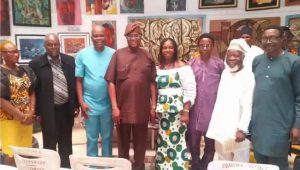A coalition of civil society organisations (CSOs) has underlined the need to put in place machinery for transforming Nigeria into a knowledge economy as well as a knowledge society.

This submission formed part of the report of the “Knowledge Cafe”, a platform provided for sharing experiences on the transformation of Nigeria to a knowledge economy and a knowledge society, tagged: “Transforming Nigeria to Knowledge Economy and Knowledge Society – Oyo State as Case Study.” It held in Ibadan, Oyo State, on Saturday, March 5, 2022.
The programme was organised by Knowledge Hub Nigeria, Knowledge for Development Partnership, Knowledge for Development Initiative and CISME Development Foundation with the support of Yoruba World Centre, University of Ibadan, Ijemo Gallery, Lagos, Tunde Odunlade Art and Culture Connexons and JADEAS Trust.
The discussants at the event were Yemisi Shyllon, Adebayo Alao, Tunde Odunlade, Chistie Ade Ajayi, the founder and Publisher of Jadeas Trust, Toluwalope Ajayi, Samuel Atayero, Tunde Agbola, and Opeyemi Orimolade, among others.
Participants agreed that citizens must be the change agents that Nigeria needed at this point of her history, adding that this can be done and must be done by collectively sharing the vision and addressing the question by millions of young Nigeria and their future.
Among other critical decisions, they agreed that there is need to prepare and groom the youth to carry the touch of knowledge partnership into the future.
In a communique issued at the end of the deliberations, the group resolved that there was need for Nigeria to benefit from the experience of other countries where knowledge has been used to transform the economy and the society.
“We should look at countries like UAE, Singapore, Austria and many others.
“There is need to put in place machinery for transforming Nigeria into knowledge economy and knowledge society in the light of the new challenges in an uncharted world.
“There is need to encourage Diaspora to be involved in putting their knowledge on the table in the development of Nigeria
“There is urgent need to address our education through effective investment in knowledge, science, technology, engineering and mathematics.
“There is need to benefit from the experience of other countries where knowledge has been used to transform the economy and the society. We should look at countries like UAE, Singapore, Austria and many others.
“Building capacity and knowledge transfer are keys to developing marketable skills and enhancing human asset for meeting the challenges of knowledge, innovation, technology, creativity and entrepreneurship in a digitalised ecosystem.
“There is need to advance the relationship between knowledge and creativity with a view to developing business models and investment opportunities.
“Creating knowledge economy and knowledge society can be better achieved through collaboration with government, private sector, NGOS and society. It is partnership for development.
“There is need to turning challenges of knowledge society to opportunities by putting in place necessary policies, actions, leadership, and commitment of all the citizens.
“There is need for cultural identity through use of indigenous languages and promotion of culture, art and creativity.
“The methodology applied by Oyo State Government in recent time using science, data collection and logic to transform knowledge should be commended and recommended as template for use by other state governments.
“The various training modules and global certification courses by Knowledge for Development Partnership leading to the award of Certified Knowledge Practitioners be explored for human capital development as this is relevant in a changing world where multi-task functions are needed,” the communique stated.
The communique also recommended the use of functional library, digitalisation and proper documentation of information should be explored in an age where knowledge is the heart of development and information is the currency.
It also stressed the need to catch the youths young, adding that commitment and total dedication to knowledge management, data, and historical information should be encouraged in schools across the country.
